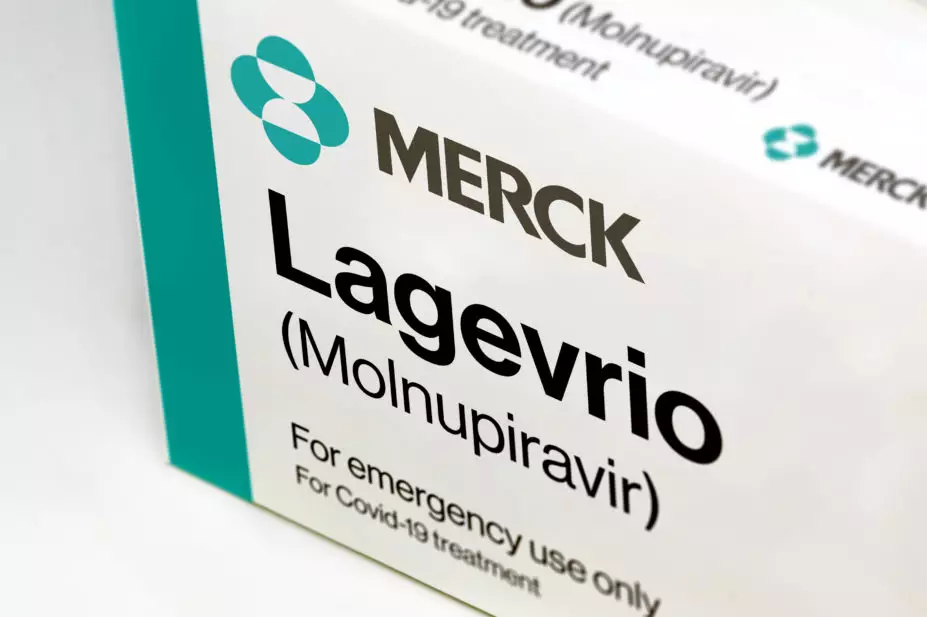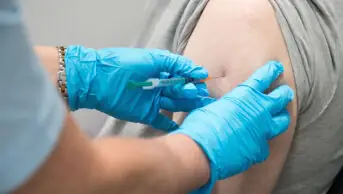
More than 5,400 packs of the oral antiviral molnupiravir for the treatment of COVID-19 were dispensed in England in the first month it was provided, according to figures released by the UK Health Security Agency (UKHSA).
The data was published in a therapeutics technical briefing by the UKHSA on 21 January 2022, which also included dispensing data for the monoclonal antibody (mAb) sotrovimab and mAb cocktail ronapreve, made up of casirivimab and imdevimab.
The briefing said that, up to 16 January 2022, 5,426 packs of 40x200mg capsules — a full course — of molnupiravir had been dispensed, as well as 5,609 500mg/8mL vials of sotrovimab. Both treatments have been in clinical use in community settings since 16 December 2021.
Figures for ronapreve, which has been in clinical use for inpatients since 17 September 2021, showed that more than 21,400 co-packaged vials had been dispensed as of 16 January 2021; 20,503 of casirivimab 300mg + imdevimab 300mg, and 897 of casirivimab 1332mg + imdevimab 1332mg.
From 16 December 2021, NHS England began offering molnupiravir and sotrovimab to eligible patients outside of hospitals through specially set up COVID-19 medicines delivery units. Eligible patients include those at very high risk of hospitalisation or death from COVID-19, such as people who are immunocompromised or some patients with cancer.
Stephen Hughes, a consultant antimicrobial pharmacist at Chelsea and Westminster NHS Foundation Trust, who is involved in prescribing and dispensing molnupiravir on behalf of a COVID-19 medicines delivery unit (CMDU), said that the treatment appeared to be “well-tolerated” with no expected dose adjustments required, even in extremes of renal and liver function, and with no known drug-drug interactions.
“However, the risk of foetal toxicity in women who may or are planning to become pregnant is an ongoing concern and requires additional scrutiny and screening,” he added.
“Organising a timely supply has been a challenge, particularly as a patient may not be always isolating at a home address; however, these logistical issues have all but been overcome with the developing CMDU services.”
Molnupiravir is also currently being rolled out to patients through the national ‘Platform adaptive trial of novel antivirals for early treatment of COVID-19 In the community’ (PANORAMIC), which, having enrolled more than 4,500 participants in just seven weeks, is the UK’s fastest recruiting interventional clinical trial to be delivered through primary care.
However, at least 6,000 more participants are needed “as soon as possible” to enable scientists to understand more about how to deploy these treatments more widely, the Department of Health and Social Care said on 25 January 2022.
It explained that the recruitment drive for the trial was being backed by charities including Kidney Care UK, Cystic Fibrosis Trust and Diabetes UK.
“The vaccines are critical as a first line of defence, but antivirals form a vital part of our approach as we learn to live with COVID by preventing the most vulnerable from being hospitalised,” said Sajid Javid, health and social care secretary.
To be eligible for enrolment on to the trial, participants must be aged 50 years and over, or aged 18–49 years with underlying health conditions that make them clinically more vulnerable. All participants need to have had a positive PCR or lateral flow test result and to have felt unwell with COVID-19 symptoms within the past five days.
In clinical trials, molnupiravir appeared to reduce the risk of hospitalisation or death for at-risk, non-hospitalised adults with mild-to-moderate COVID-19 by 30%.
Through the Antivirals Taskforce, the government has procured 4.98 million courses of antivirals — including 2.23 million courses of molnupiravir and 2.75 million courses of Pfizer’s oral antiviral paxlovid.
It is expected that paxlovid will become available, both in the community and via the PANORAMIC trial, by early February 2022.
Read more: Antivirals for COVID-19 — five questions that must be answered


